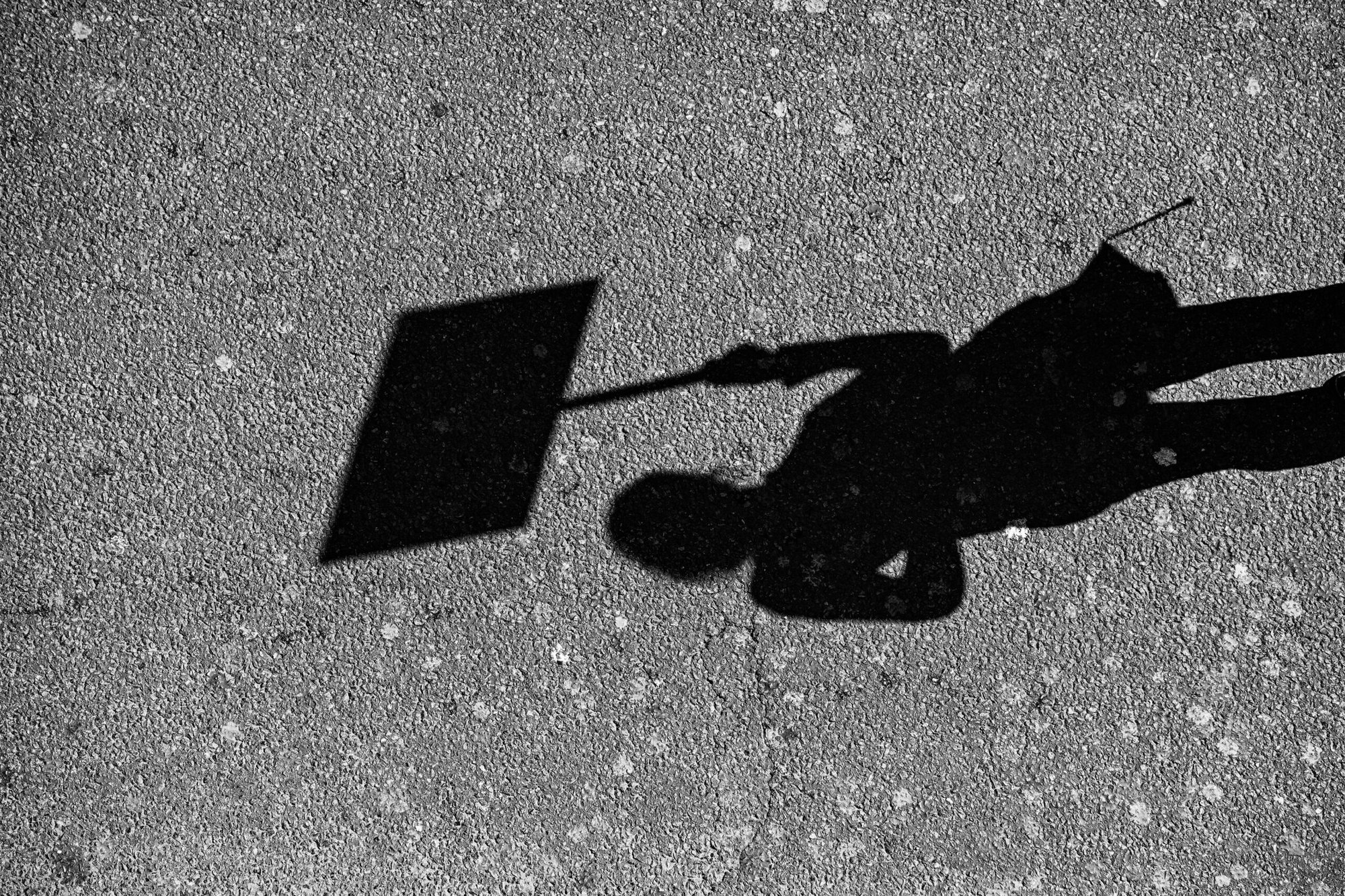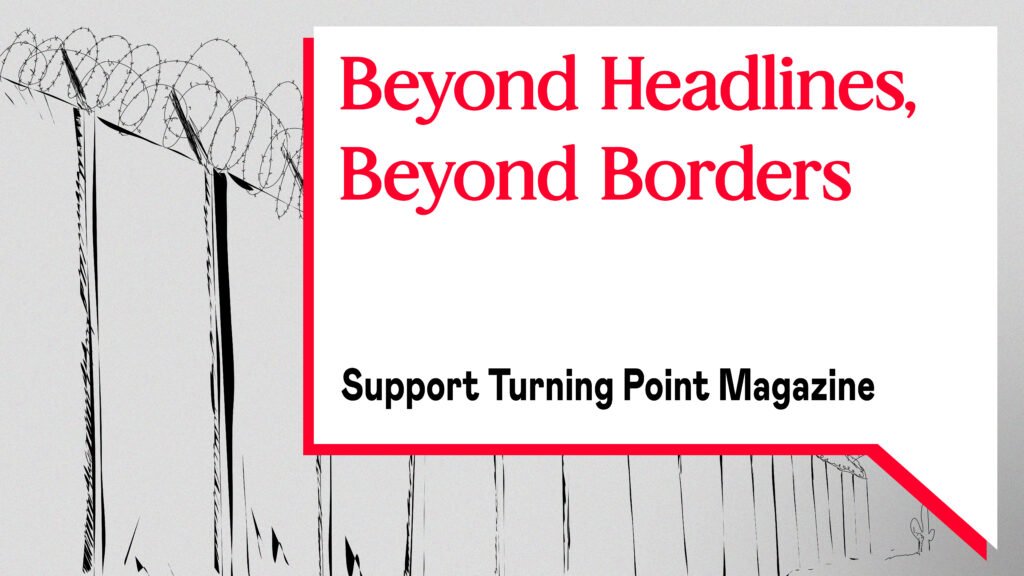Cover photo: France, Paris 2012: Shadow of a protester on the streets of Paris during a demonstration. ©Maryam Ashrafi
In the opening scene of her book The Mandarins, Simone de Beauvoir describes a group of revolutionary intellectuals celebrating the New Year’s Eve of 1944 in a recently liberated France. While many of them are not interested in discussing the future, they are keen on celebrating the present. Henri, the main character, who is believed to be Albert Camus, points out that the next battle would be more insidious than the one against Nazi Germany. Betrayed by the Russian Revolution and the authoritarian Bolshevik regime, he sees the persuasion toward liberalism, in turn, as a danger to the democratic values they had been fighting for. As a betrayal of their dreams for freedom and equality.
Fast-forwarding several decades, liberal democracy had been firmly established as the favored political system of the Western-dominated capitalist world. Shaped into a tool for the elite, who systematically and increasingly employed it to erode the liberties’ of the people; while hiding its true nature behind empty slogans, such as ‘free elections’, ‘individual rights’, and the ‘rule of law.’ As of lately, something has changed: liberal democracy is on the brink of collapse. No matter how many people take to the streets, the political elite remain deaf to their demands. Meanwhile, populist and fascist movements have gained momentum, seizing power and subverting democratic norms. And its not only happening in Europe, but globally.
Other signs of this collapse have shown themselves in the abandonment of many post-World War II institutions tasked with maintaining justice and humanitarian rights. The world has watched as their rulings have been discarded, particularly when their findings have not aligned with a specific worldview or interests. The United Nations has long lost its meaning and gravity. There is no effective mechanism to stop war crimes or authoritarian consolidation. The Security Council is unable to intervene in any conflict due to its polarization; China and Russia routinely veto human rights resolutions. Major powers systematically ignore the International Criminal Court. For instance, in 2024, it issued an arrest warrant for the Israeli Prime Minister Benjamin Netanyahu, which Western governments dismissed. NATO has been revived only after the Russian invasion of Ukraine, and it is gaining new momentum. It has accepted Finland and Sweden into the alliance and secured a new stream of funds to finance its members’ ramped-up military spending. The EU has failed to halt democratic backsliding in countries like Hungary and Poland despite providing funds, even as rule-of-law violations persist. Even the liberal scholar Francis Fukuyama, in his 2022 essay on democracy, had to admit: “Liberal democracy is now in retreat worldwide, and the reasons are complex but rooted in the failure of elites to address the grievances of ordinary people.”
According to data published in the Freedom House Report, there has been a steady decline in global political rights and civil liberties over the past decade—worse than at the height of the Cold War. Many elected leaders have gradually transformed into authoritarian figures, exploiting the electoral and judicial system for their own advantage, ruling with executive orders, and increasing population control and repression through surveillance technology.
This is also true of Hungarian Prime Minister Viktor Orbán, who has taken control of the judiciary and the educational system. He has silenced independent media with draconian laws. The same with Giorgia Meloni in Italy, whose government has recently passed a new security bill that represses and punishes various forms of dissent. Meloni, the first Italian woman to serve as prime minister and who refuses to be formally addressed as a woman, has aggressively pursued new inhumane immigration policies, implementing stricter border control measures and rhetoric that stigmatizes migrants and refugees.
Then there is Donald Trump, a de facto anti-democrat, who has no problem implementing a far-right agenda and governing with decrees that aim to restrict civil liberties. According to Masha Gessen, a journalist and author of Surviving Autocracy (2020), Trump is “trying to dismantle the structures that safeguard liberal democracy.” In the United States, Trump has established a cult of personality. His ability to maintain unwavering support among his base despite legal and ethical controversies has led to the weakening of the democratic opposition. He has promoted and amplified conspiracy theories and baseless facts, such as the Afrikaner genocide in South Africa, and firmly believes climate change is a hoax. The US president has called the media “the enemy of the people” and openly uses legal and extrajudicial means to silence his critics. We should not be surprised that in the current world system, authoritarians are gaining ground. People like Trump or Orbán are nothing but the expression of the dominant system, and unfortunately, too many fail to recognize authoritarian tendencies or feel impotent against them.
The liberal establishment has cultivated a belief that authoritarian regimes, such as the brutal dictatorships in North Korea or Syria, could never happen in the West. They do not realize how authoritarianism emerges through bureaucracy, surveillance, and manufactured consent. The media is complicit in these deceptive portrayals. As a result, the public does not seem to grasp the severe erosion of democratic rights that leads to authoritarianism. Let us be clear, in many instances, instead of dramatic overthrows, it occurs through small, seemingly harmless actions, such as packing the courts, undermining judicial independence, restricting press freedom, and curtailing civil liberties. Again, Masha Gessen: “Authoritarianism is not an event. It’s a process—a process of normalization.” And this includes normalizing the unthinkable, including genocide.
While the gradual dismantling of democratic institutions is often subtle, once enough power is concentrated in the hands of a leader or political party, it becomes much harder to reverse. By the time the public fully acknowledges the shift, it is often too late to turn back. Crackdowns are frequently framed as anti-terrorism, public safety, or digital modernization efforts. In other words, authoritarianism wears liberal clothing—free elections, legal jargon, televised trials—while emptying institutions of content.
The End of Liberal Democracy, this month’s theme, aims to reflect on what is happening to the dominant system and question where there is room for change. We will begin in Kurdistan, where the dissolution of the Kurdistan Workers’ Party (PKK) has made headlines all over the world. And so we ask: what does it really mean? The PKK has made several demands, including the democratization of Turkey, and called for the Turkish Congress to step up in democratic reforms. The republic of Turkey has long lost its democratic ambitions, becoming an electoral autocracy. Its president, Recep Erdogan, has jailed over 100 journalists in less than a year and incarcerated the mayor of Istanbul on baseless accusations. The PKK has always sought a peace process and a political solution to the Kurdish question. The peace initiative marks the latest development in a lengthy process for one of the world’s longest-lasting revolutionary movements. Rather than an end, the guerrilla movement stated, it is an opening for a new era of post-liberal democratic politics.
We will also publish two stories from the other side of the Atlantic. Last year’s elections in Mexico highlighted the dangers of running as a candidate in an electoral system that has been called a “narco-democracy.” In fact, more than a dozen candidates were killed, and many others abducted to prevent them from making a meaningful change. We will also publish a personal account from the US that offers an experience from the student mobilizations for Gaza, highlighting how the campaigns of hatred in the US enable the genocide against the Palestinian people.
Finally, taking up the noted global dimensions of our theme, we will publish a photo essay about Nemo Smith, an AI-generated politician. The deepfake project of the London-based artist Marcel Top criticizes the shameless public manipulation that has come to shape the current and upcoming elections in the UK.
We at Turning Point believe the first step in confronting the end of liberal democracy is to dismantle the myth of liberal immunity, which is both harmful and dangerous. Resisting is not enough; we need to start fighting back, reclaiming spaces, and ramping up the dialogues. We need to defend all civil liberties and create alternatives to the current exploitative system. As explored in Mandarins, intellectuals and cultural figures still play an essential role, even 80 years later—for it takes a great deal of courage to imagine a different world.





